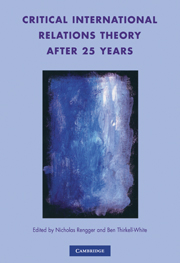Book contents
- Frontmatter
- Contents
- Preface
- Notes on contributors
- Editors' Introduction
- Looking back from somewhere: reflections on what remains ‘critical’ in critical theory
- Transnational theories of order and change: heterodoxy in International Relations scholarship
- Happy Anniversary! Time and critique in International Relations theory
- Is critical theory always for the White West and for Western imperialism? Beyond Westphilian towards a post-racist critical IR
- The promise of critical IR, partially kept
- Towards a sociology of global morals with an ‘emancipatory intent’
- Between Kant and Pufendorf: humanitarian intervention, statist anti-cosmopolitanism and critical international theory
- Index
Happy Anniversary! Time and critique in International Relations theory
Published online by Cambridge University Press: 06 July 2010
- Frontmatter
- Contents
- Preface
- Notes on contributors
- Editors' Introduction
- Looking back from somewhere: reflections on what remains ‘critical’ in critical theory
- Transnational theories of order and change: heterodoxy in International Relations scholarship
- Happy Anniversary! Time and critique in International Relations theory
- Is critical theory always for the White West and for Western imperialism? Beyond Westphilian towards a post-racist critical IR
- The promise of critical IR, partially kept
- Towards a sociology of global morals with an ‘emancipatory intent’
- Between Kant and Pufendorf: humanitarian intervention, statist anti-cosmopolitanism and critical international theory
- Index
Summary
Abstract. All critical theories lay claim to some kind of account not only of the present of international politics and its relation to possible futures, but also of the role of critical theory in the present and future in international politics. This article argues that if critical international theory is to have a future that lives up to its revolutionary ambition, then it needs to listen more carefully to the voices of postcolonial and feminist critics and take on board the heterotemporality of international politics.
Introduction
Contributors to this Special Issue have been asked to comment on the fate of critical International Relations theory, twenty-five years after two of its founding texts were published. My particular contribution takes its starting point from the peculiar features of calendar temporality that underlie this request. In his ‘Theses on the Philosophy of History’, Walter Benjamin commented on the distinction between clock time and calendar time:
The great revolution introduced a new calendar. The initial day of a calendar serves as a historical time-lapse camera. And, basically, it is the same day that keeps recurring in the guise of holidays, which are days of remembrance. Thus the calendars do not measure time as clocks do; they are monuments of a historical consciousness of which not the slightest trace has been apparent in the last hundred years. In the July revolution an incident occurred which showed this consciousness still alive. On the first evening of fighting it turned out that the clocks in towers were being fired on simultaneously and independently from several places in Paris.
- Type
- Chapter
- Information
- Critical International Relations Theory after 25 Years , pp. 71 - 90Publisher: Cambridge University PressPrint publication year: 2007



